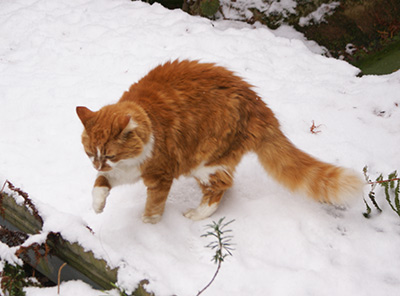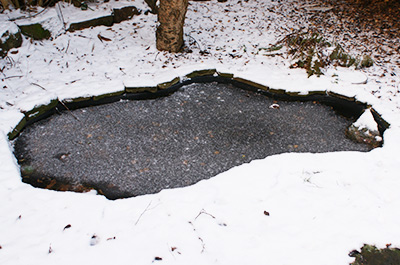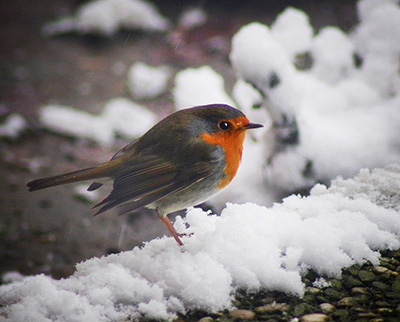Winter can be a beautiful time of the year - however, cold and icy weather can present dangers for pets and wildlife. Here are some tips and advice to help animals in winter.
Keeping Cats Safe:
 Staying Warm:
Staying Warm:
Cats left outdoors for long periods in very cold temperatures are at risk of developing hypothermia or even frostbite, and for older cats subzero temperatures can even be fatal. Cats should not be shut out of the house for long periods of time and should always have access to warmth and shelter.
Always accompany your cat in a safe, enclosed area if it's their first experience of snow.
Cat Flaps:
If your cat usually toilets outside, please ensure they can get can get back in again! Check your cat flap regularly to make sure it doesn’t get frozen shut by ice or snow.
Indoor Activity:
Give cats plenty of toys and activities to provide exercise as they stay indoors more in the cold weather.
Arthritic Cats:
If your cat has arthritis, the cold can increase inflammation in their joints. Provide warm, comfortable areas for them to rest, and make it easier for them to access their favourite places.
Outdoor Cats:
For cats who remain outside in cold weather, such as feral cats, please make sure there is some outside shelter, which is dry and waterproof. This could be a shed, garage or similar, with some warm and dry bedding to snuggle down in. At the very minimum, a dry, waterproof cardboard box, covered with a bin liner or some cling film can make all the difference. It will need to be weighted down or tucked under a bush for stability, and contain a thick layer of straw, which acts as a heat-conserving 'nest'. Clothing, towels and blankets etc. are not advisable for this as they retain moisture; encouraging mould or mildew, and can also freeze in very cold weather.
Road Gritting - Rock Salt Danger:
The rock salt used to grit roads and pavements is dangerous to cats (and dogs) if ingested. They can easily walk through the substances left by gritters or salt on paths and lick it off their paws. Consuming rock salt can cause dehydration, liver failure and pancreatitis. In snowy and icy weather, keep your cats away from roads or paths where salt has been used, or wash their paws when they come in. Symptoms of consuming rock salt (which contains the same ingredient as table salt - sodium chloride, but also has harmful chemicals such as magnesium) include burns to the mouth and throat and excessive salivating and drinking. If you’re worried, contact your vet immediately.
Antifreeze:
Sheds and garages need to be checked for hazards where pets are likely to be seeking shelter: Antifreeze is highly toxic if ingested, so never leave antifreeze containers unattended in places where an animal could get to it, and take care to mop up any spillages. Less than a teaspoonful of Antifreeze can be fatal if ingested by cats or other animals, and usually causes death by kidney failure. So please take care when attending to your car.
Cats & Cars:
The warmth of a cooling car engine is a very tempting refuge for cats. Before starting your engine on a cold morning, bang loudly on the bonnet to give cats a chance to get away if they are sheltering there.
Protecting Other Pets:
 Dogs:
Dogs:
Your dog will still need routine and exercise, even in the winter months. It’s important to thoroughly wipe off your dog’s paws, legs and stomach when returning from a walk in snowy or icy weather, to prevent paws becoming impacted with snow, which can cause them discomfort.This will also avoid your dog ingesting rock salt used on icy paths and roads, and other potentially harmful ice melting chemicals when self grooming. Clipping the fur on your dogs feet to keep it shorter, will make them less likely to pick up the salted grit.
Keep dogs and other pets away from frozen ponds, as thin ice can break under their weight.
Guinea Pigs & Rabbits:
Guinea pigs and rabbits need extra consideration at this time of year. Before winter sets in, check hutches and housing to ensure they are waterproof, making any necessary repairs, and patching any leaks. Hutches should be raised clear of the ground to prevent damp; bricks are ideal for this. They need extra bedding in their housings, and regular checks to ensure their water feeders aren't frozen. Be prepared to move them into a shed, unused garage, or even indoors when the weather is particularly cold. Don’t forget too, that small furries need exercise and companionship all year round! More here: www.rabbitrehome.org.uk/care/winter.asp
Horses:
If horses and ponies are kept outside during the winter, they must have access to shelter at all times. Check that their source of fresh water hasn't iced over. If you live in an area that regularly experiences sub-zero temperatures, there are heating devices available specifically designed for horse troughs. They will also need to be supplied with extra hay, as winter grazing provides very little nutrition. Horses burn more calories in winter to keep warm, so providing extra hay will help maintain heat and health. A rug may be needed, particularly if they are clipped, but be careful not to over-blanket (if unsure, consult your vet). Daily exercise, and regular hoof care is also important during the winter months.
Cold weather can cause discomfort for pets who suffer from Arthritis. If you suspect this may be the case, take your pet for a winter check-up from your vet. There is plenty of advice, and help available.
Help for Wildlife
 Wild Birds:
Wild Birds:
Please remember the wildlife in your garden... In winter, birds have difficulty finding their usual food supplies such as berries, insects, seeds, worms and fruit. Put out food regularly, specially in severe weather - twice daily if possible (in the morning and in the afternoon before it gets dark). Where cats are around, avoid putting food on the ground; use a bird table, or hanging feeders where cats cannot reach. Check bird baths and water feeders regularly. Providing birds with fresh, unfrozen water this time of the year will really help.
Pondlife:
If you have a pond that has frozen over, melt a hole in the ice to allow the wildlife to drink. This also prevents toxic gases from building up in the water, which may harm fish or frogs that are hibernating at the bottom. To do this, carefully place a saucepan of hot water on the surface ice to gently melt a hole in it. Never tip boiling water straight onto the pond or break the ice with force, as this can be dangerous for any residing wildlife.
Hedgehogs:
Leaving piles of leaves, logs or compost in your garden will provide places for hedgehogs to hibernate, and will attract insects for them to eat. Building a hedgehog house is a good alternative. Hibernation usually takes place between November and mid-March. A regular supply of fresh water and food will help hedgehogs prepare for hibernation, and can continue until the food stops being taken. Meat flavoured wet cat or dog food, cat biscuits, cooked meat leftovers such as mince or chicken, chopped boiled eggs or specialist hedgehog food can be provided, but bread or milk are not suitable. Although it's important not to disturb hibernating hedgehogs, it is important to thoroughly check there are no hedgehogs nesting in bonfires before lighting them.


